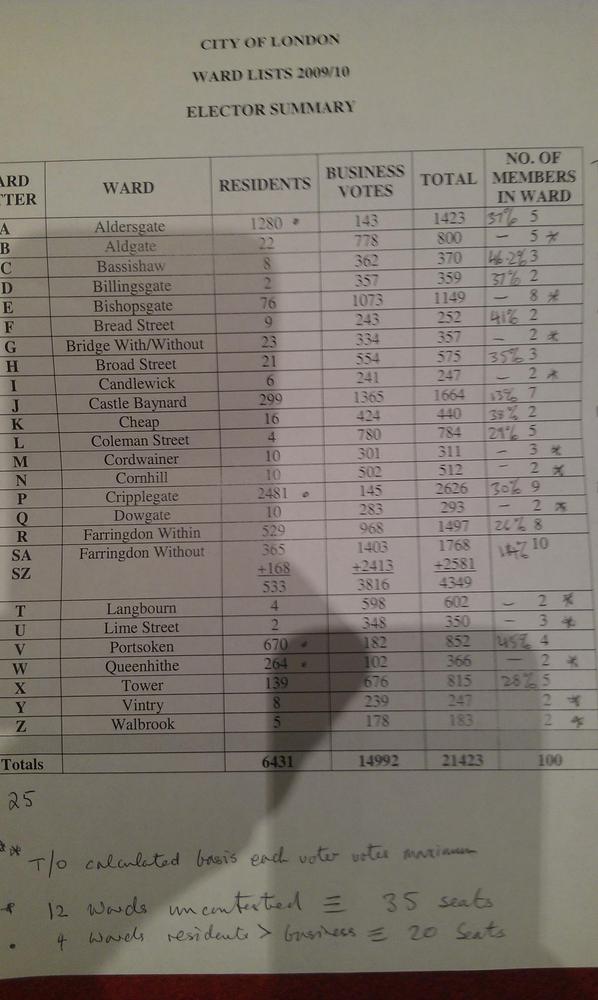Imagine a city consisting of fewer than 10 thousand residents. Imagine that city’s government elected by businesses, and the bigger the business, the more votes it has. This city has funds amounting to billions of pounds, accumulated over a thousand years, which it can use at will, with no public accountability, to promote its interests around the world.
This city is London. Not the metropolis we know so much about, but the thing referred to as the “square mile” or The City. Often referred to either as an archaic but quaint and harmless relic from the past, or as a place where bankers simply do business, neither description gets close to the reality of this entity.
Secret City, the film I’ve made with Michael Chanan does try to do just that.
Ten years ago I met with my former lecturer, Maurice (now Lord) Glasman, in an East End cafe, seeking the odd bit of part time teaching in political theory. I came out of that meeting bewildered. Maurice told me the story of this barely visible body, the Corporation of London, which is the government of London. I’d heard of it, but thought it was a bit like a local authority, with a bloke called the Lord Mayor at the helm, who was a bit like the Queen – ceremonial and harmless.
Glasman told of its historical origins, how it pre-dated Parliament, how it had shaped modern-day London, refusing to incorporate, transporting English people who’d fled the enclosures, and creating the poverty-stricken surrounding boroughs. He’d become interested in the Corporation whilst petitioning a private bill it was pushing through Parliament to deliver plural votes to businesses.I joined Maurice, the Rev William Taylor and a multi-millionaire businessman in their campaign to petition this bill, the City of London Ward Elections act, and was stunned by two things: one, that it seemed to be trying every trick in the book to allocate votes on the basis of the wealth of a company; two, that Parliament seemed powerless to stop it.
Indeed, although there were no rational ground on which to pass the bill, it was eventually given the nod. This was hard politics, the dirty underbelly of British culture. It is one thing for a few people to know reality of the City of London and the Corporation that runs it, but another to make it public knowledge. Bits and bobs have been written about the Corporation – back in 2002 by David Henckie at The Guardian, and over the past year by Melanie Newman at The Bureau for Investigative Journalism. But there’s hardly anything written in books or magazines, and certainly no “fourth estate” to regularly scrutinise this particular government. Back in 2002 Political Quarterly published a piece I wrote about the Ward Elections Act campaign, but the impetus for making a film about it came from those who I’d told the story to.On recounting the tale of the Corporation to a UWE student, Anthony Killick, we considered film a perfect way to tell the story of this state within a state. With plenty of contacts, no budget, little equipment but a determination to tell the story of the Corporation we began. The enthusiasm the story invokes in those who hear it led to Michael Chanan offering to direct the film, and thus Secret City was born, in no small thanks to the availability of relatively cheap and usable digital camera equipment and editing suites.
One of the most surprising things the film tells us is that despite all the complex theorising about the nature of power, power is not always as nebulous as one may imagine. Indeed the Corporation of London is a hub, a centralised power that reaches far and wide. There is in fact a small conspiring clique of people intent on moulding the fabric of Britain and much of the rest of the world around its interests. There was a point from which slavery was organised, a spearhead of the empire, a location from which global capitalism started out. The incredible thing is that this location and its institutions seem to all intents and purposes unchanged over the past 1000 years.We see in the film how the past few centuries have witnessed the Corporation – formally a pluralist democratic body – subsumed under the interest of finance capital to become a single interest lobby group.
The Corporation has promoted the domination of finance capitalism for a couple of centuries now, but its propaganda machine went into overdrive from the 1980s, as it sought to use Thatcher and Reagan’s neo-liberalism to push for further deregulation. By the 1990s, the Corporation had in many respects turned into one of the most effective ideology factories in the world, lobbying UK regulators, and using its global network of influence to push for an ever more deregulated financial sector. This continued right up to the 2008 crash. Having primed audiences around the world for two or three decades to understand the importance of deregulated finance, the Corporation faced a bit of a crisis: how to maintain “confidence” in neo-liberalism when the whole world has seen it fall flat and fail. How, for example, could people be convinced to accept George Osbourne’s £500bn tax break for insurance companies while we’re being told there’s not enough money for the NHS? As Melanie Newman and the Bureau for Investigative Journalism showed in The Guardian earlier this year, the Corporation established a fund to deal with public perceptions after the crash, spending £90million in 2011 alone on consultancies, donations, lobbying, and so on. There are many nebulous, distributed and invisible forms of power, but such a realisation ought not, as is too frequently done, push us to discount other, concrete forms of power that we can point to, touch and indeed overthrow.Secret City shines a light on one of these sites and we hope will lead to a more adequate understanding of power and in particular the role of the Corporation of London in sustaining the hegemony of finance. It is for this reason that we chose Parliament for the preview screening of the film, inviting MPs, journalists, campaign groups and academics, before rolling it out to community, political and campaign groups, cinemas and universities.
The preview screening of Secret City took place in Parliament on 16th October. See secretcity-thefilm.com for details of forthcoming screenings. If you would like a screening, please contact salter.lee@gmail.com
